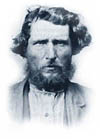
Often heralded as a brilliant strategist, Gabriel Dumont spent much of his life as a Métis traditionalist. He spoke 6 First Nations languages and survived through his skill in trapping, hunting, fishing and farming. He was known as ‘the prince of the prairie’. Dumont orchestrated many of the battles of the Rebellions and was Riel’s ‘right hand man’. Dumont was a skilled hunter, a trait that carried over into military manoeuvres and won him a victory at Fish Creek. Dumont fled Canada after the Battle of Batoche and received asylum in the United States, where he furthered the Métis cause by organizing the southern communities.

Ambroise Lepine
Adjutant-General of the first Provisional Government in Manitoba, Lepine was instrumental in the sentencing of Orangeman Thomas Scott. Lepine was a staunch follower of Riel and a strong Métis activist. In 1874, he was tried and convicted for the murder of Scott, but after the Governor General intervened, his sentence was lessened. Lepine was commuted to 2 years imprisonment and lost his civil rights. It wasn’t until 1915 that those rights were restored.

Marguerite Riel
While exiled and teaching school in Montana, Riel met and married Marguerite Bellehumeur, an American Metisse. When Riel returned to Saskatchewan in 1885 to help the Métis, Marguerite accompanied him. Marguerite died just a few months after Riel’s execution. Riel and Marguerite had two children together both of whom died in young adulthood.

Louis Schmidt was born in the Red River settlement and was schooled in Montreal with Riel. There, the two forged a friendship that would carry through their lives until Riel broke from the church. Schmidt was a member of the 1869 Provisional Government and helped to draft the List of Rights, a bill that helped form the basis of the Manitoba Act. Schmidt later testified to Riel’s insanity at his treason trial after the 1885 rebellion.
Additional Resources
- Manitoba Historical Society (www.mhs.mb.ca)
- The Virtual Museum of Métis History and Culture (www.metismuseum.com)
- Métis Nation of Ontario – Métis History and Culture (www.metisnation.org)
- Métis Nation of Alberta – The Voice for Métis Albertans (albertametis.com)
- Prairies to Woodlands – Discover Southern Michif and other Métis languages! (michif.org)
- Rupertsland Institute – Métis Centre of Excellence (rupertsland.org)